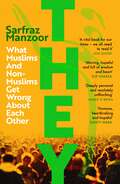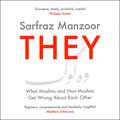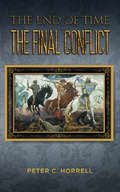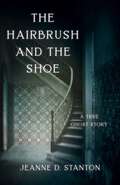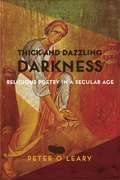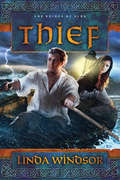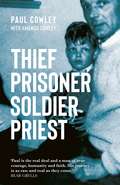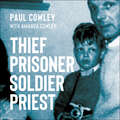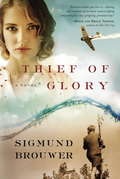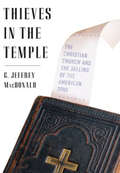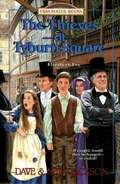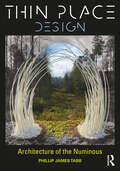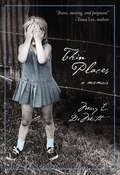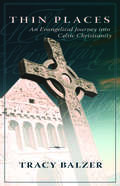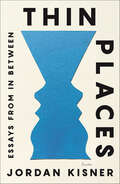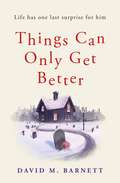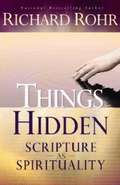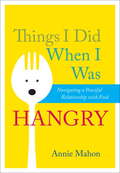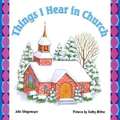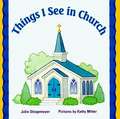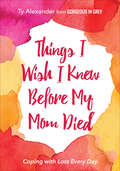- Table View
- List View
They: What Muslims and Non-Muslims Get Wrong About Each Other
by Sarfraz ManzoorA powerful and deeply personal exploration of a divided country - and a hopeful vision for change.'This is not another book about the relationship between Muslims and non-Muslims. It is THE book. . . . Absolutely not to be missed.' - Matthew d'AnconaSarfraz Manzoor grew up in a working-class Pakistani Muslim family in Luton - where he was raised to believe that they were different, they had an alien culture and they would never accept him. They were white people.In today's deeply divided Britain we are often told they are different, they have a different culture and values and they will never accept this country. This time they are Muslims.Weaving together history, reportage and memoir, Sarfraz Manzoor journeys around Britain in search of the roots of this division - from the fear that Islam promotes violence, to the suspicion that Muslims wish to live segregated lives, to the belief that Islam is fundamentally misogynistic. THEY is also Manzoor's search for a more positive future. We hear stories from Islamic history of a faith more tolerant and progressive than commonly assumed, and stories of hope from across the country which show how we might bridge the chasm of mutual mistrust. THEY is at once fiercely urgent, resolutely hopeful and profoundly personal. It is the story of modern, Muslim Britain as it has never been told.'Humane, heart breaking and hopeful' - Kirsty Wark'Extraordinarily researched and courageously confronting, Sarfraz Manzoor writes with a rare blend of historical depth and personal authenticity. Profoundly personal and refreshingly honest, They tells the urgent and often untold story of Muslim Britain.' - David Lammy MP
They: What Muslims and Non-Muslims Get Wrong About Each Other
by Sarfraz ManzoorA powerful and deeply personal exploration of a divided country - and a hopeful vision for change.'This is not another book about the relationship between Muslims and non-Muslims. It is THE book. . . . Absolutely not to be missed.' - Matthew d'AnconaSarfraz Manzoor grew up in a working-class Pakistani Muslim family in Luton - where he was raised to believe that they were different, they had an alien culture and they would never accept him. They were white people.In today's deeply divided Britain we are often told they are different, they have a different culture and values and they will never accept this country. This time they are Muslims.Weaving together history, reportage and memoir, Sarfraz Manzoor journeys around Britain in search of the roots of this division - from the fear that Islam promotes violence, to the suspicion that Muslims wish to live segregated lives, to the belief that Islam is fundamentally misogynistic. THEY is also Manzoor's search for a more positive future. We hear stories from Islamic history of a faith more tolerant and progressive than commonly assumed, and stories of hope from across the country which show how we might bridge the chasm of mutual mistrust. THEY is at once fiercely urgent, resolutely hopeful and profoundly personal. It is the story of modern, Muslim Britain as it has never been told.'Humane, heart breaking and hopeful' - Kirsty Wark'Extraordinarily researched and courageously confronting, Sarfraz Manzoor writes with a rare blend of historical depth and personal authenticity. Profoundly personal and refreshingly honest, They tells the urgent and often untold story of Muslim Britain.' - David Lammy MP
They: What Muslims and Non-Muslims Get Wrong About Each Other
by Sarfraz ManzoorA powerful and deeply personal exploration of a divided country - and a hopeful vision for change.'This is not another book about the relationship between Muslims and non-Muslims. It is THE book. . . . Absolutely not to be missed.' - Matthew d'AnconaSarfraz Manzoor grew up in a working-class Pakistani Muslim family in Luton - where he was raised to believe that they were different, they had an alien culture and they would never accept him. They were white people.In today's deeply divided Britain we are often told they are different, they have a different culture and values and they will never accept this country. This time they are Muslims.Weaving together history, reportage and memoir, Sarfraz Manzoor journeys around Britain in search of the roots of this division - from the fear that Islam promotes violence, to the suspicion that Muslims wish to live segregated lives, to the belief that Islam is fundamentally misogynistic.THEY is also Manzoor's search for a more positive future. We hear stories from Islamic history of a faith more tolerant and progressive than commonly assumed, and stories of hope from across the country which show how we might bridge the chasm of mutual mistrust.THEY is at once fiercely urgent, resolutely hopeful and profoundly personal. It is the story of modern, Muslim Britain as it has never been told.'Humane, heart breaking and hopeful' - Kirsty Wark'Extraordinarily researched and courageously confronting, Sarfraz Manzoor writes with a rare blend of historical depth and personal authenticity. Profoundly personal and refreshingly honest, They tells the urgent and often untold story of Muslim Britain.' - David Lammy MP(P) 2021 Headline Publishing Group Limited
The End of Time – The Final Conflict
by Peter C. HorrellThe Book of Revelation describes coming events. St John, the writer, sees an open door and is invited to come up to learn what must take place in the future. Some of these prophetic events are already in motion and slowly building up for Armageddon. These prophecies are dire warnings to all the inhabitants of Earth. St John is giving us a vivid and frightening picture of earth-shattering events, leading up to the end of time. The world's clock is ticking away. Time is running out fast. Having turned its back on God and on His Son, Jesus Christ, the Saviour of mankind, humankind is responsible for its own destruction. It is bringing God's retribution. Jesus summed up the state of humans when He said: "Out of man's heart come evil thoughts, immorality, theft, murder, adultery, unbridled greed, malice, fraud, indecency, envy, slander, arrogance and foolishness." (Matt. 15:19). No one can deny that what lies hidden in the heart of humans is observable, not only to God, but also to the rest of humankind. God's patience is running out (Gen: 6:3). His judgement is inevitable.
The Hairbrush and the Shoe: A True Ghost Story
by Jeanne D. StantonWhen a workman is pushed and hissed at by something invisible on the stairs of her family’s 150-year-old townhouse, Jeanne Stanton must confront the possibility that a ghost inhabits. She proceeds in the way any former Harvard Business School case writer would: she embarks upon a rigorous search for proof of the ghost’s existence and identity, exploring the literature and lore of ghosts; the practices of mediums, psychics, and “ghost busters;” and the various attempts that have been made over the decades to verify ghostly sounds and sights through scientific methods. After visits to a psychic provide insights but not proof, Stanton enters the equally mysterious realms of physics and neurology, hoping science has answers. Notables encountered during her research efforts include Henry James, Arthur Conan Doyle, Oliver Sacks, and Sigmund Freud, the latter a colleague of her home’s original owner. Wry and witty, Stanton takes time out to laugh at her own futile attempts at ghost detection—spending a sleepless night in an allegedly haunted bedroom, creeping along the edges of rooms in search of cold spots—along the way. Determined to get to the bottom of the ghost business, Stanton wavers between skepticism and belief, searching for definitive evidence—and almost failing to find it. Almost.
Thick and Dazzling Darkness: Religious Poetry in a Secular Age
by Peter O'LearyHow do poets use language to render the transcendent, often dizzyingly inexpressible nature of the divine? In an age of secularism, does spirituality have a place in modern American poetry? In Thick and Dazzling Darkness, Peter O’Leary reads a diverse set of writers to argue for the existence and importance of religious poetry in twentieth- and twenty-first-century American literature. He traces a poetic genealogy that begins with Whitman and Dickinson and continues in the work of contemporary writers to illuminate an often obscured but still central spiritual impulse that has shaped the production and imagination of American poetry.O’Leary presents close and comprehensive readings of the modernist, late-modernist, and postmodern poets Robinson Jeffers, Frank Samperi, and Robert Duncan, as well as the contemporary poets Joseph Donahue, Geoffrey Hill, Fanny Howe, Nathaniel Mackey, Pam Rehm, and Lissa Wolsak. Examining how these poets drew on a variety of traditions, including Catholicism, Gnosticism, the Kabbalah, and mysticism, the book considers how modern and contemporary poets have articulated the spiritual in their work. O’Leary also argues that an anxiety of misunderstanding exists in the study and writing of poetry between secular and religious impulses and that the religious nature of poets’ works is too often marginalized or misunderstood. Examining the works of a specific poet in each chapter, O’Leary reveals their complexity and offers a defense of the value and meaning of religious poetry against the grain of a secular society.
Thief
by Linda WindsorExiled in shame and wounded in battle, Caden O'Byrne accepts a mission of penance--to search for his healer's long-lost daughter. At worst, he'll finally get his death wish. At best, this could be God's second chance. But the lovely minstrel Sorcha wants no part in him, his newfound God, or the rescue. In fact, she's robbed him blind--to help finance her work of buying young captives and returning them to their families. She's also gone into debt and promised to marry a man she doesn't love--all for the chidlren's sake. But before she and Caden can sort out the situation, a treacherous murder forces them to run for their lives...together. While Caden's rekindled faith is tested, Sorcha wonders if his God is real. If so, can a thief like her dare hope for His mercy? And do the two of them have a chance of reaching home--Sorcha's real home--alive?
Thief Prisoner Soldier Priest
by Paul CowleyPaul Cowley grew up in Manchester amid the chaotic world of his alcoholic parents. His early exposure to heavy drinking, explosive arguments and the unnerving aggression of his father led him into homelessness and crime. By seventeen he was behind bars. Years later, following a career in the army which 'made a man of him' yet ultimately failed to give him direction and purpose, Paul's search for meaning resulted in an unexpected encounter with God that changed his life for ever.This remarkable and touching account of his early years, from thief to prisoner, soldier and, eventually, priest, should inspire anyone who feels their life is out of control. It is, by turns, a dramatic, traumatic and comic story, yet one that stands as a testament to how God offers hope to all who have the courage to respond.
Thief Prisoner Soldier Priest
by Paul CowleyPaul Cowley grew up in Manchester amid the chaotic world of his alcoholic parents. His early exposure to heavy drinking, explosive arguments and the unnerving aggression of his father led him into homelessness and crime. By seventeen he was behind bars. Years later, following a career in the army which 'made a man of him' yet ultimately failed to give him direction and purpose, Paul's search for meaning resulted in an unexpected encounter with God that changed his life for ever.This remarkable and touching account of his early years, from thief to prisoner, soldier and, eventually, priest, should inspire anyone who feels their life is out of control. It is, by turns, a dramatic, traumatic and comic story, yet one that stands as a testament to how God offers hope to all who have the courage to respond.
Thief Prisoner Soldier Priest
by Paul CowleyAn inspiring and raw autobiography from the Reverend Paul Cowley MBE.Paul Cowley grew up in Manchester amid the chaotic world of his alcoholic parents. His early exposure to heavy drinking, explosive arguments and the unnerving aggression of his father led him into homelessness and crime. By seventeen he was behind bars. Years later, following a career in the army which 'made a man of him' yet ultimately failed to give him direction and purpose, Paul's search for meaning resulted in an unexpected encounter with God that changed his life for ever.This remarkable and touching account of his early years, from thief to prisoner, soldier and, eventually, priest, should inspire anyone who feels their life is out of control. It is, by turns, a dramatic, traumatic and comic story, yet one that stands as a testament to how God offers hope to all who have the courage to respond.(P) 2022 Hodder & Stoughton Limited
Thief of Glory
by Sigmund Brouwer"Brouwer makes you live it....sharing each moment of an exotic and terrifying time and place in a gripping, personal way."--Bodie and Brock Thoene, authors of Take this Cup A boy coming of age in a time of war...the love that inspires him to survive. For ten year-old Jeremiah Prins, the life of privilege as the son of a school headmaster in the Dutch East Indies comes crashing to a halt in 1942 after the Japanese Imperialist invasion of the Southeast Pacific. Jeremiah takes on the responsibility of caring for his younger siblings when his father and older stepbrothers are separated from the rest of the family, and he is surprised by what life in the camp reveals about a woman he barely knows--his frail, troubled mother. Amidst starvation, brutality, sacrifice and generosity, Jeremiah draws on all of his courage and cunning to fill in the gap for his mother. Life in the camps is made more tolerable as Jeremiah's boyhood infatuation with his close friend Laura deepens into a friendship from which they both draw strength. When the darkest sides of humanity threaten to overwhelm Jeremiah and Laura, they reach for God's light and grace, shining through his people. Time and war will test their fortitude and the only thing that will bring them safely to the other side is the most enduring bond of all.
Thieves in the Temple: The Christian Church and the Selling of the American Soul
by G. Jeffrey MacdonaldWhat has become of the Christian Church? Once devoted to molding Americans into better people, in recent years the Christian Church has gotten a corporate makeover. In a desperate attempt to bolster membership rolls, ministers have begun to treat their churches more like companies, and their congregations more like customers. As a minister in a small church and as a national religion reporter, journalist G. Jeffrey MacDonald witnessed firsthand this lapse into consumerism. He realized that in an effort to cast a wide net for souls churches have sacrificed their authority to transform Americans' self-serving impulses for the better. In the headlong rush to operate more like businesses, churches are sacrificing their moral authority, perhaps permanently. The result is a crisis for the American conscience. MacDonald's incisive critique of today's movement away from true religion shows how desperately America needs a new religious reformation.
Thieves of Tyburn Square: Elizabeth Fry (Trailblazer Books #18)
by Dave Jackson Neta JacksonThrilling adventure stories introducing young readers (ages 8-12) to Christian heroes of the past. The Thief of Tyburn Square Betsey and Loren Maxwell are on their own in early nineteenth-century England after their mother is deported to New South Wales for stealing two silver candlesticks. Faced with few options, the young Maxwells are forced to live and work in a gloomy London workhouse. Betsey and her brother have a terrible time enduring the harsh treatment and strict rules of the workhouse overseers. Then Loren sees an opportunity to escape, and the pair soon find themselves back on the dangerous streets of London--with only a stolen pouch of money to support them. Their new life takes a disastrous turn when Betsey and Loren are jailed for pickpocketing in Tyburn Square. Betsey is terrified that she'll never see her brother or mother again, but a visit from a kind Quaker woman named Elizabeth Fry gives her courage. Can this compassionate prison reformer save Betsey and her brother from the gallows in Tyburn Square? ALONE AND IN PRISON WITH NO ONE TO TURN TO . . .
Thin Place Design: Architecture of the Numinous
by Phillip James TabbWhat makes the places we inhabit extraordinary? Why are some urban spaces more vital and restorative? Wonderful landscapes, inspiring works of architecture and urban design, and the numinous experiences that accompany them have been an integral dimension of our culture. Up-lifting spaces, dramatic use of natural light, harmonic proportional geometry, magical landscapes, historic sites and vital city centers create special, even sacred moments in architecture and planning. This quality of experience is often seen as an aesthetic purpose intended to inspire, ennoble, ensoul and spiritually renew. Architecture and urban spaces, functioning in this way, are considered to be thin places.
Thin Places: A Memoir
by Mary E. DeMuthIn her moving spiritual memoir, Mary DeMuth traces the winding path of “thin places” in her life—places where she experienced longing and healing more intensely than before. As DeMuth writes, “Thin places are snatches of holy ground, tucked into the corners of our world, where we might just catch a glimpse of eternity. They are aha moments, beautiful realizations, when the Son of God bursts through the hazy fog of our monotony and shines on us afresh.”From losing her earthly father to discovering a heavenly Father who never leaves, from singing Olivia Newton-John songs to the sky to worshiping God under a French sun, from surviving abuse as a latchkey kid to experiencing the joy of mothering three children, DeMuth’s story calls readers to a deeper understanding of their own story. With unusual spiritual wisdom, she looks for God in the past so that she might experience him more profoundly in the present. Her powerful words invite readers to know God in a new way—a God ready to break through any ordinary day or extraordinary pain and offer a glimpse of eternity.
Thin Places: An Evangelical Journey into Celtic Christianity
by Tracy BalzerThin Places introduces contemporary Christians to the great spiritual legacy of the early Celts, a legacy that has remained undiscovered or inaccessible for many evangelical Christians. It provides ways for us to learn from this ancient faith expression, applying fresh and lively spiritual disciplines to our own modern context.
Thin Places: Essays from In Between
by Jordan KisnerIn this provocative essay collection, an award-winning writer shares her personal and reportorial investigation into America’s search for meaning.A Los Angeles Times BestsellerA Lit Hub | Chicago Review | Ms. Magazine March PickA Lambda Literary Most Anticipated BookWhen Jordan Kisner was a child, she was saved by Jesus Christ at summer camp, much to the confusion of her nonreligious family. She was, she writes, “just naturally reverent,” a fact that didn’t change when she—much to her own confusion—lost her faith as a teenager. Not sure why her religious conviction had come or where it had gone, she did what anyone would do: “You go about the great American work of assigning yourself to other gods: yoga, talk radio, neoatheism, CrossFit, cleanses, football, the academy, the American Dream, Beyoncé.”A curiosity about the subtle systems guiding contemporary life pervades Kisner’s work. Her celebrated essay “Thin Places” (Best American Essays 2016), about an experimental neurosurgery developed to treat severe obsessive-compulsive disorder, asks how putting the neural touchpoint of the soul on a pacemaker may collide science and psychology with philosophical questions about illness, the limits of the self, and spiritual transformation. How should she understand the appearance of her own obsessive-compulsive disorder at the very age she lost her faith?Intellectually curious and emotionally engaging, the essays in Thin Places manage to be both intimate and expansive, illuminating an unusual facet of American life, as well as how it reverberates with the author’s past and present preoccupations.“An unsettling and an endlessly curious read.” —Sarah Neilson, Electric Literature
Things Can Only Get Better: An absolutely heartwarming and uplifting read
by David M. Barnett*FROM THE INTERNATIONALLY BESTSELLING AUTHOR OF CALLING MAJOR TOM*'I loved it. Nostalgic without being saccharine, hopeful, real characters with edge. A brilliant book.' - Hayley Webster'I adored it! Truly uplifting. Exactly what people want and need to read right now.' - Daisy BuchananFor elderly churchwarden Arthur Calderbank, there's no place like home. His home just so happens to be a graveyard.He keeps himself to himself, gets on with his job, and visits his wife everyday for a chat. When one day he finds someone else has been to see his wife - and has left flowers on her grave - he is determined to solve the mystery of who and why. He receives unlikely help from a group of teenage girls as he searches for answers, and soon learns that there is more to life than being surrounded by death.Set during the 90s, when we were all just common people believing things could only get better, this is an uplifting story about the power of a little kindness, friendship and community. For readers who enjoy Sue Townsend, Ruth Hogan and Joanna Cannon.
Things Can Only Get Better: An absolutely heartwarming and uplifting read
by David M. Barnett*FROM THE INTERNATIONALLY BESTSELLING AUTHOR OF CALLING MAJOR TOM*''I loved it. Nostalgic without being saccharine, hopeful, real characters with edge. A brilliant book.'' - Hayley Webster''I adored it! Truly uplifting. Exactly what people want and need to read right now.'' - Daisy BuchananFor elderly churchwarden Arthur Calderbank, there''s no place like home. His home just so happens to be a graveyard.He keeps himself to himself, gets on with his job, and visits his wife everyday for a chat. When one day he finds someone else has been to see his wife - and has left flowers on her grave - he is determined to solve the mystery of who and why. He receives unlikely help from a group of teenage girls as he searches for answers, and soon learns that there is more to life than being surrounded by death.Set during the 90s, when we were all just common people believing things could only get better, this is an uplifting story about the power of a little kindness, friendship and community. For readers who enjoy Sue Townsend, Ruth Hogan and Joanna Cannon.
Things Hidden: Scripture as Spirituality
by Richard RohrIn this exploration of central themes of Scripture, Richard Rohr transforms the written word, discovering in these ancient texts a new and vital meaning, relevant and essential for modern Christians. He uncovers what the Bible says about morality, power, wisdom and the generosity of God in a manner that demands a life changing response from believers. Rohr offers his readers a Christian vision of abundance, grace and joy to counteract a world filled with scarcity, judgment and fear, a vision that can revolutionize how we relate to ourselves, others and the world. In this explanation of central themes of Scripture, Richard Rohr transforms the written word, discovering in these ancient texts a new and vital meaning relevant and essential for modern Christians. He uncovers what the Bible says about morality, power, wisdom, and the generosity of God in a manner that demands a life-changing response from believers.
Things I Can't Forget (Hundred Oaks #3)
by Miranda Kenneally"A must read...I couldn't put it down." —Simone Elkeles on Catching JordanFrom the bestselling author of Catching Jordan comes a new teen romance sure to appeal to fans of Sarah Dessen.SOME RULES WERE MEANT TO BE BROKEN.Kate has always been the good girl. Too good, according to some people at school—although they have no idea the guilty secret she carries. But this summer, everything is different...This summer she's a counselor at Cumberland Creek summer camp, and she wants to put the past behind her. This summer Matt is back as a counselor too. He's the first guy she ever kissed, and he's gone from geeky songwriter who loved The Hardy Boys to a buff lifeguard who loves to flirt...with her.Kate used to think the world was black and white, right and wrong. Turns out, life isn't that easy...Praise for Miranda Keaneally:"Fresh, fearless, and totally romantic."—Sarah Ockler, bestselling author of the Twenty Boy Summer"Catching Jordan is the romantic comedy I've been waiting for. I loved it!"—Jennifer Echols, author of Such a Rush"An incredibly well-written, beautiful story that balances romance, drama, and comedy perfectly."—Bookish, on Stealing Parker
Things I Did When I Was Hangry
by Annie MahonAfter years of struggling with eating disorders and anxiety around food and eating, Annie Mahon figured that having a path, any path, would be helpful. When she read The Miracle of Mindfulness by Thich Nhat Hanh, she changed her relationship with food and transformed nearly every aspect of her life.In Things I Did When I Was Hangry, Annie shares her path to mindful cooking and eating. The book fits together more like a wheel than sequential steps. Readers are invited to jump in and take what works for them.Each section tells short, humorous, and poignant stories about Annie's own journey toward more conscious cooking and eating. She shares mindfulness practices that support more ease around food, and simple, delicious vegetarian recipes compliment each section, demonstrating mindful alternatives for every meal.Mindful eating has been shown to improve body acceptance, diminish negative self-talk, and support weight loss. Annie Mahon's stories, recipes, and suggestions are scaffolding anyone can use to develop an easier and more joyful relationship with food and eating.
Things I Hear in Church
by Julie StiegemeyerThings I Hear in Church and Things I do in Church are board books explaining the meaning of the words and actions in church services
Things I See in Church
by Julie StiegemeyerHelp toddlers participate in the church service... through the things they see. Now it's easy to nurture faith development and help your child feel included in the worship service. Things I See in Church helps young children follow along in the service and better understand what is happening. Take it along and start your child on the road to understanding worship!
Things I Wish I Knew Before My Mom Died: Coping with Loss Every Day
by Ty AlexanderThis #1 Amazon Best Seller from one of today&’s top bloggers is a compassionate guide through the process of grieving for a lost loved one. Ty Alexander has touched many lives with her popular lifestyle blog, Gorgeous in Gray. But in her early 20s, her own life was upended when her mother was diagnosed with cancer. Ty was suddenly forced to become not just a loving daughter, but a caregiver, patient advocate, and researcher. And when her mom passed the pain was overwhelming. Though she still grieves every day, her experience has taught her how to move on while still honoring the love that endures. In this beautiful, honest, and intensely personal guidebook, Ty provides the insight and inspiration that every mourner needs to make it through this time of unrelenting emotional pain and sadness. Her deep compassion, understanding, and enlightening true stories will help readers along every step of their grieving journey, from the shock of discovery through anger, disbelief, and despair, and ultimately to acceptance and healing. We all grieve differently, but the pain of loss is universal. Things I Wish I Knew before My Mom Died can provide a reassuring voice, a helping hand, and a shining beacon of hope for anyone who is heartsick and suffering.
